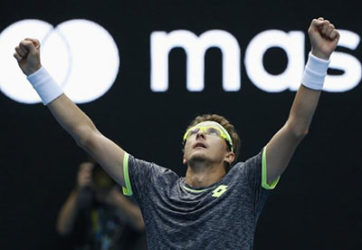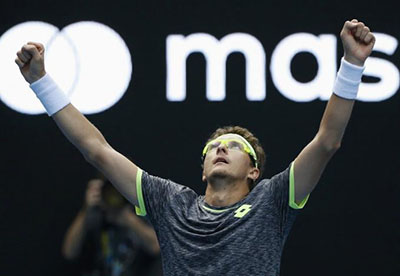
MELBOURNE, (Reuters) – Novak Djokovic’s bid for a record seventh Australian Open title came to a stunning end on Thursday when the Serbian packed his bags and headed home in the wake of a second-round upset at the hands of world number 117 Denis Istomin.
The 29-year-old has bestrode the blue hardcourts of Melbourne Park like a colossus over the last decade, winning his first grand slam title here in 2008 and adding five more in six years from 2011.
Thursday’s 7-6(8) 5-7 2-6 7-6(5) 6-4 defeat was only his second in his last 42 matches at the year’s first grand slam, the other coming on the same Rod Laver Arena against eventual champion Stan Wawrinka in the 2014 quarter-finals.
Last year, he beat Andy Murray in the final for the second straight season to match Roy Emerson’s record of six titles and, while seeded second behind the Scot, was favourite to retain it next week.
The shock on Thursday was not simply that the 12-times grand slam champion had lost to a journeyman Uzbek – albeit a journeyman playing the match of his life – but that he went out with so little fight.
Everybody waited and waited for the explosion of emotions that would indicate that Djokovic had tapped into the iron-plated resilience that had carried him through so many potential defeats at Melbourne Park and elsewhere.
This was, of course, the same court where he slugged it out with Rafa Nadal for five hours and 53 minutes to win the 2012 final in an exhibition of never-say-die tennis that would be hard to better in the annals of grand slam title deciders.
On Thursday, though, the moment never came – even if Istomin was still expecting it right up until the point that Djokovic sent a service return long to conclude the four hour, 48 minute contest.
“With Novak, you never know,” said Istomin. “Even if it’s 40-Love or 40-15 on your serve, you still might not get there. I had to concentrate until the end.
“For me, it was impossible to think that I can hold it for five sets with Novak, physically and mentally.”
Djokovic paid credit to the brilliant match 30-year-old Istomin undoubtedly played, but was at a loss to explain why he had been unable to move up a gear.
“In the first couple games of the fourth set, that’s where it turned around. That’s where I had to use my chances, step it up,” he said.
“I didn’t. He started playing better from that point on. He just started swinging through and getting more confidence. Then it was really a gamble.
“I was believing and hoping I could do it, but it wasn’t that day. That’s all I can say. Not much to add.”
Thursday’s defeat came as even more of a surprise because Djokovic had started the season so well when he ended Murray’s 28-match, five-tournament winning streak in an epic final at the Qatar Open.
It is Briton Murray, who took the number one ranking off the Serbian at the back end of last year, who looks to be the most likely beneficiary of Djokovic’s early departure.
The Scot, who earlier took to the practice courts without obvious discomfort just a few hours after turning his ankle during a second round victory, has lost all five of his finals at Melbourne Park, four of them to Djokovic.
Roger Federer and Rafa Nadal, both former champions returning at this tournament after injury-forced spells on the sidelines might also fancy their chances of filling the void left by the Serb, as might Wawrinka.
Djokovic was reluctant to pitch immediately into too much analysis of where he went wrong after his earliest grand slam exit since 2008.
“I’m not used to losing in the Australian Open second round,” Djokovic said. “I’ve always played so well. Throughout last 10 years, I’ve won six titles here. This court has been so nice to me. I enjoyed it very much.
“Of course, it’s disappointing. But the end of the day I have to accept it.
“(I’m going to) take my bags and go home.”

